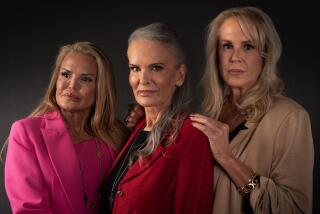Taking It Personally : Reflections on the Verdicts, the City and Ourselves : Seeking a More Common Language
- Share via
Throughout his murder trial, O.J. Simpson’s silence rendered him a symbol without a voice, his being a screen for projection. The succession of images flashes by:
The bootstrap kid turned gridiron hero. The millionaire. The lover of the high life. The wife abuser. The loving father. The “colorless” black man who turned his back on his people. The black man set up by a racist police officer. The aging actor. The accused murderer.
And now the free man.
But there are still two lives lost, those of Nicole Brown Simpson and Ronald Lyle Goldman, with no hard answers, no semblance of closure to offer small comfort to these suffering families. The verdict is a punctuation mark, a period or exclamation point, closing another chapter on yet another as-only-L.A.-can-do-it escapade.
But it isn’t over. Or shouldn’t be.
For Los Angeles, it is only the beginning in a search for language, frankness, forthrightness. In stirring up issues too often skirted, discussions often quickly silenced for fear of upsetting the careful, though invisible balance.
We speak too many languages, without interpretation.
At moments it was the very discussion around this trial, and widely varying poles of it, that took on a life of its own. That--while using one of the many O.J.s as a symbol--oftentimes threatened to take center stage, derail what was at the heart of the issue: the murder of two human beings.
What has been difficult to separate, to explain, to understand, is that the prism of race does indeed affect perception. As does gender. As does class. Black men see the case different from white men. Black women different from black men. Rich black men different from working-class black men. As we are not monoliths, the issues are not cut and dry, nor are the distinctions simply black or white. It is complicated, variegated.
For those new to the region, who see Angelenos of all stripe as race-obsessed, the first point of understanding is that all of this is relatively new to a population of people who for so long, bereft of a public forum, have found quieter, hidden places to work out their issues around race and other inequities . . . if at all.
The discussions have pointed up the dramatic gaps as well in understanding and perception--between women and men across race as well as class lines. How privilege works as a tool of leverage, at the least, if not a masterfully played card representing the ultimate chip of power.
*
Defense attorney Johnnie L. Cochran Jr. thumped the race card as if it were the Scriptures, asking the jury to send a message against racism and police abuse in this city. While the prosecution attempted to smooth over the charged race aspects, (Christopher A. Darden dodged the “n” word) knowing the potential, the inflammatory nature, especially in Los Angeles’ tense climate.
Outside that courtroom, over the many months, weeks, muttered conversation has bloomed to full-throated, lively debate. Race politics loudly dominate discussions, the shards of images of 1992’s violence and fires still fresh. Evocative.
Detective Mark Fuhrman’s inflammatory words flipped the on-switch to the video loop of Rodney G. King’s beating. His words were an italicized reminder too soon after, underscoring the fact that the infection still festers. The seeds of why L.A. burned two times in three decades.
Is it Simpson on trail or the LAPD? Or is it race in L.A. coming in to take another bow but disguised as something else?
And is this a case about race?
It isn’t, but it is.
It’s that and so much more. The card universally played was emotion.
*
There is seldom an outlet providing this kind of discussion outside of an event. One that exhibits the nuances of these issues.
Even among African Americans, some see the race card as a reality, saying that race appears to permeate many aspects of life. Others perceive it as a smoke screen, a convenient device used by a man who had distanced himself from his past, his people, yet able to lay claim when all else failed.
The emotion King elicited as a rumpled figure fighting off batons and boots stood in stark contrast to the custom suit-clad Simpson flanked by his high-priced defense team. King was an everyman figure, around whom many could rally emotionally, Simpson was more complex and, because of his perceived estrangement, was viewed by many blacks as a complicated, if not dubious, entity.
Though discussions of racism, both institutional and overt, found a forum within the context of this trial, only the surface of the issues was scratched.
It hasn’t been a pretty journey, finding the language to broach race and class. The discussions were circumscribed, truncated.
Perhaps it all will be swept away without resolution.
Los Angeles is a comparatively new city with a not-so-new mission: trying to find a strong voice amid the platitudes and posturing. The real issue is, we don’t need a symbol--whether it be O.J. Simpson or Rodney King--to act as a catalyst to address these issues.
These emotional events spark awareness. We are forced to confront each other’s realities, personal truths. Whether or not all were listening remains to be seen. And if so, the jury is out on whether any of it sticks.
More to Read
The biggest entertainment stories
Get our big stories about Hollywood, film, television, music, arts, culture and more right in your inbox as soon as they publish.
You may occasionally receive promotional content from the Los Angeles Times.










